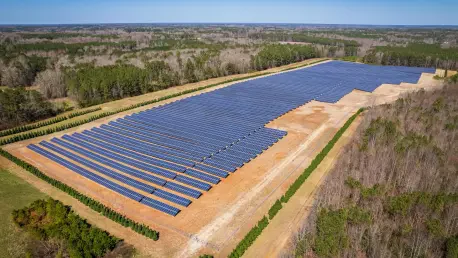Picture a world where supply chain disruptions can halt a solar revolution before it begins. Vistra Corp., a prominent figure in the renewable energy scene, finds itself at the heart of such a scenario. With ambitious plans to transform existing Illinois coal plant sites into solar and battery storage powerhouses, Vistra’s endeavors are now on a knife edge due to unforeseen logistical challenges.
The Solar Wave That Stalled: Understanding the Turbulence
Vistra’s request to extend commercial operation deadlines for its 833 MW solar and battery projects in Illinois from 2028 to 2030 underscores a broader struggle. Supply chain bottlenecks and shifting United States trade policies have led to delays in securing vital equipment, disrupting smooth transitions from traditional coal-based power generation to renewable sources. These transformations are not merely about technology—they significantly influence electricity consumption methods and the broader pursuit of renewable energy goals.
Solar Dreams Deferred: Breaking Down Vistra’s Challenge
The specifics of Vistra’s hurdles reveal a landscape fraught with delays. Essential components, such as transformers and circuit breakers, face severe setbacks. Contracts have been signed, yet delivery timelines are stretching far beyond initial estimates. For instance, transformers anticipated for 2028 may not arrive until late 2029, jeopardizing project timelines. Escalating demand and stricter import policies compound these supply chain woes, creating unwelcome constraints on renewable energy momentum.
Industry Soundwaves: Expert Perspectives on Renewable Roadblocks
Energy experts and regulatory bodies like FERC provide crucial insight into these delays. They emphasize the necessity of extending deadlines for renewable projects to prevent energy shortages. Vistra’s leadership aligns with this view, advocating for adaptability in regulatory expectations. Insights from similar projects reflect the importance of accommodating such disruptions to maintain energy supply reliability and project viability amid complex logistical challenges.
Paving the Sunlit Path: Strategic Steps Forward for Renewables
Looking forward involves crafting solutions that acknowledge and address these challenges. Companies are encouraged to develop flexible procurement strategies and robust supply chain resilience. Regulatory flexibility is vital to align project timelines with reality. Significant potential exists for policy adjustments that support sustainable energy transitions. Encouraging thoughtful regulatory evolutions can unlock bottlenecks, create more resilient energy infrastructures, and ensure the sustainable growth of the sector.
Vistra’s predicament symbolizes an intricate tapestry of policy, logistics, and market dynamics. These hurdles, although daunting, have offered an opportunity for reevaluating and improving the systems supporting renewable energy projects. By focusing on adaptable regulations and proactive supply chain strategies, the energy industry could potentially mitigate interruptions, paving the way for a more sustainable power landscape in Illinois and the broader MISO region.









